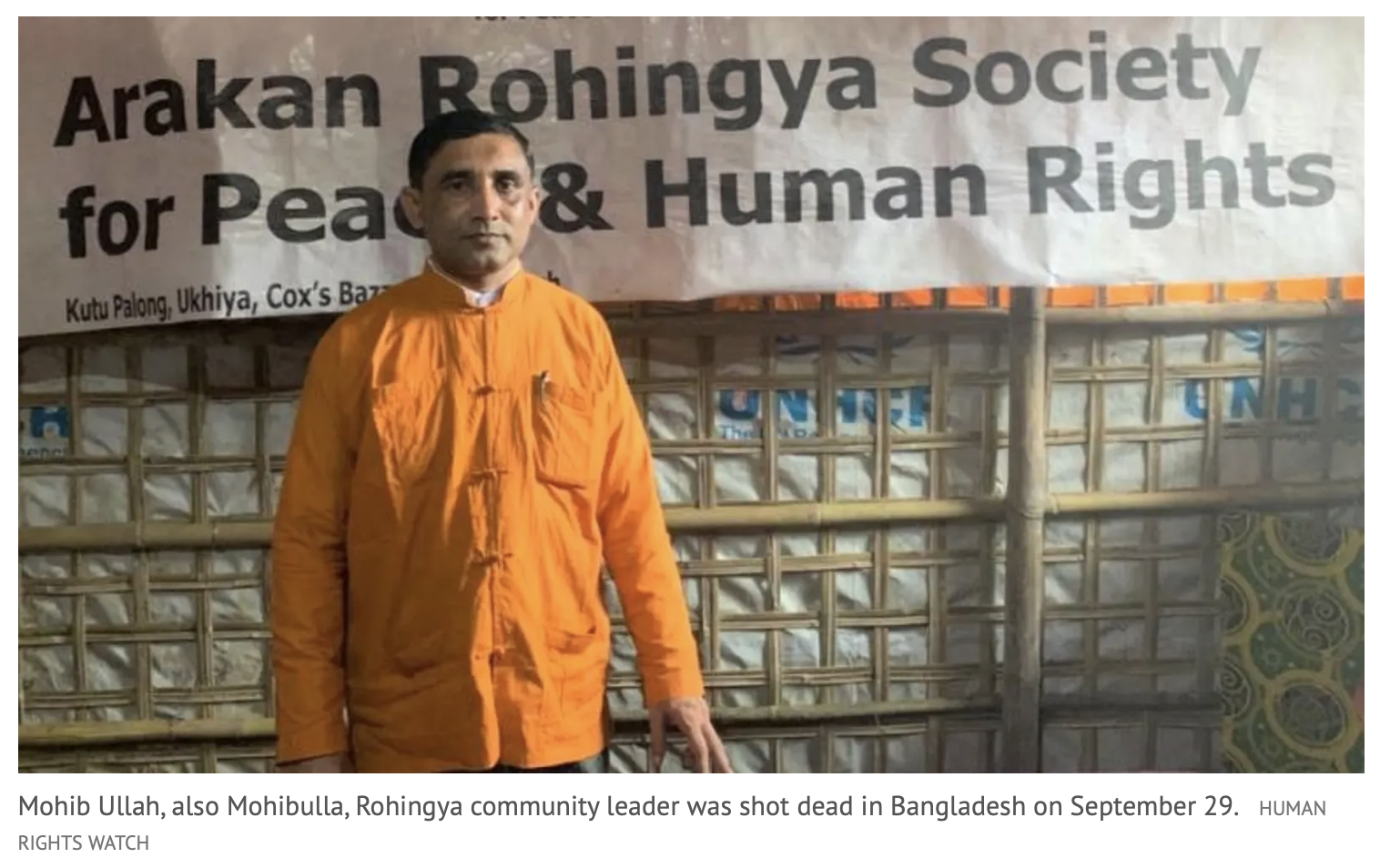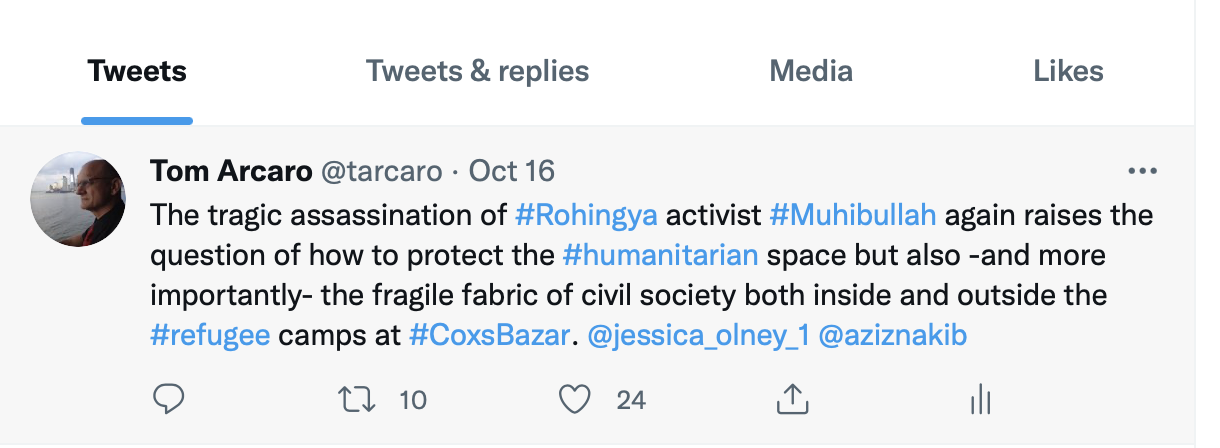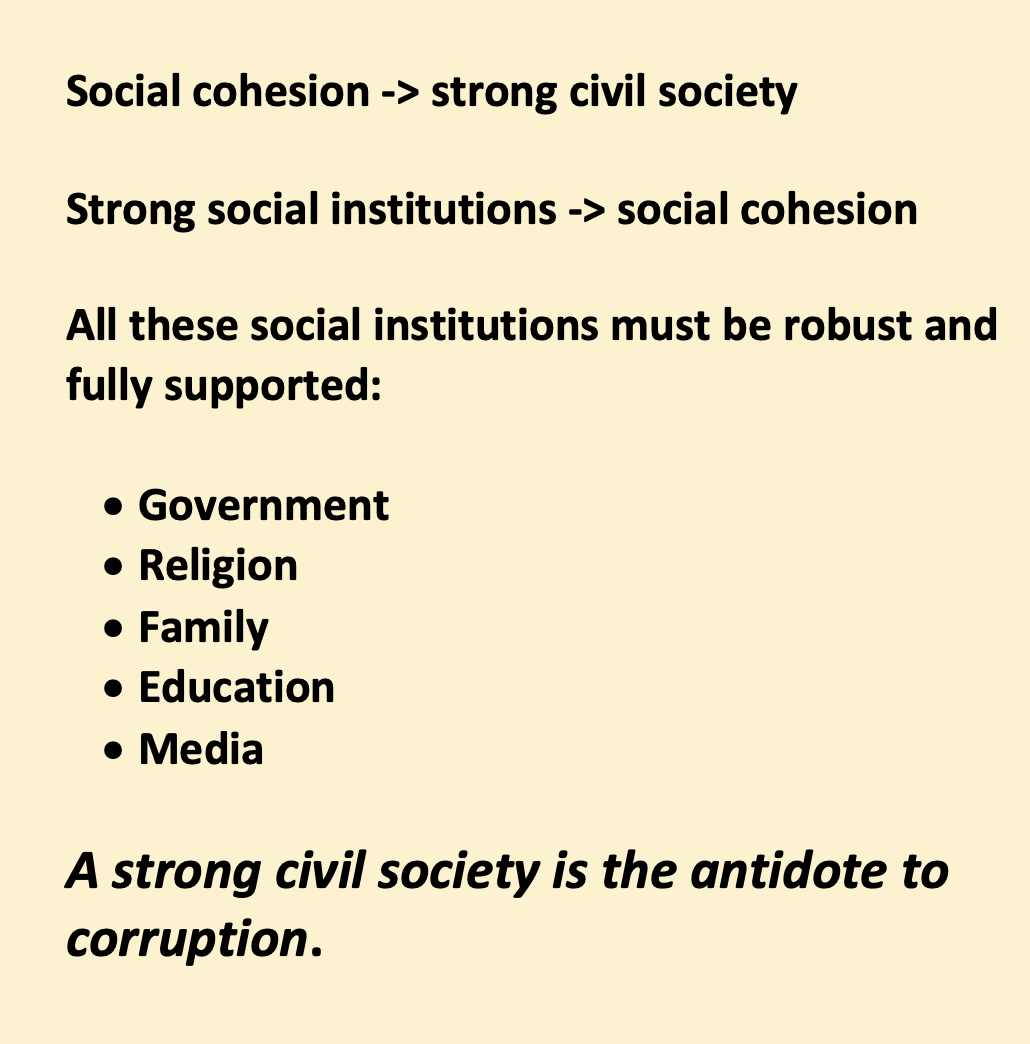Updated 11-26-21
“If I die, I’m fine. I will give my life.”
-Mohib Ullah
Protecting civil society in Cox’s Bazar and beyond
The death of a civicv leader
The UN Secretary-General Antonio Guterres described the Rohingya as “one of, if not the, most discriminated people in the world”. An ethnic and religious minority in Myanmar, the Rohingya people have been persecuted for generations, and in August of 2017 the genocide perpetrated by the Myanmar military reached a fever pitch, and nearly 750,000 Rohingya fled Myanmar to neighboring Bangladesh. Life in the sprawling refugee camps is not easy, and maintaining a transplanted civil society is a massive challenge.
The Government of Bangladesh and nearly 100 humanitarian agencies including UN, IFRC, IOM, UNHCR, etc. are responding to the humanitarian crisis of Rohingya. The Bangladeshi Government has deployed police and Armed-police Battalion (APBN) in the camps to protect the Rohingya.
On September 29, 2021 Mohib Ullah, a 48-year-old Rohingya leader and activist, was assassinated by gunmen in Cox’s Bazar, Bangladesh. Mohib Ullah devoted his life to human rights, fighting against violence in the refugee camps and working closely with community organizers and INGO staff. He served as chairperson of the Arakan Rohingya Society for Peace & Human Rights, working hard to document the Myanmar military’s genocidal crimes against the Rohingya. With an impact far beyond the refugee camp where he lived, Ullah advocated for Rohingya and refugees’ rights in international forums, traveling to Geneva, Switzerland making a speech for the United Nations Human Rights Council and Washington DC representing the Rohingya people in a meeting with then President Donald Trump.
Here in the US, I continue reading followup reports of this horrible assassination and have now talked with several Rohingya and others close to Mohib Ullah. In the last couple years, I have grown close to many Rohingya and feel a deep connection to their plight. What I am hearing from my contacts is that Ullah’s death was not unexpected since he posed a threat to those who seek control of the camps through violence.
One of my contacts (who wishes to remain anonymous) said,
“Nevertheless, there is a lack of active and sincere response to protect Civil Society leaders. Humanitarian agencies also seem to be callous to ensure appropriate security measures for Mohib Ullah and other human rights activists. Camp residents said that, since Mohib was receiving the threats, no remarkable measures were taken to protect him.“
I have learned that though humanitarian organizations like UNHCR, IOM, World Vision, Danish Refugee Council, MSF, and others control most of the daylight hours, the night is ruled by darker forces. Armed and highly organized gangs extort money, intimidate whole neighborhoods, kidnap, and even kill those who test their control. There is a recognized leadership structure in this sprawling camp complex, and Camp-in-Charge (CIC) officials from the Bangladesh’s Refugee Relief and Repatriation Commission (RRRC) perform administrative and coordination duties regarding the delivery of humanitarian services to each of the camp residents in their respective neighborhoods. The CIC work closely with the UN and INGO organizations and a great deal gets accomplished during the daytime. The horrible fact is that many of those gains, for example confronting sex and gender based violence (SGBV), are reversed during the night times when the organized gangs rule.
extort money, intimidate whole neighborhoods, kidnap, and even kill those who test their control. There is a recognized leadership structure in this sprawling camp complex, and Camp-in-Charge (CIC) officials from the Bangladesh’s Refugee Relief and Repatriation Commission (RRRC) perform administrative and coordination duties regarding the delivery of humanitarian services to each of the camp residents in their respective neighborhoods. The CIC work closely with the UN and INGO organizations and a great deal gets accomplished during the daytime. The horrible fact is that many of those gains, for example confronting sex and gender based violence (SGBV), are reversed during the night times when the organized gangs rule.
More violence
I have just learned of another violent attack in the camps with 7 dead and many more wounded in a night time attack at an Islamic seminary. A culture of fear is taking over, eroding any sense of peace and safety.
Here is how one camp resident describes the situation,
“This is the time that knowledge is not working righteously. Ya Allah, we get stuck in the chaos and disorder situation with trauma and PTSD every day. There is no end of challenge in our lives. It feels like the calamity never ends. We live through one crisis after another.”
Questions
I am saddened and upset by this horrible assassination. Just like others, I have questions about who did this and why, having my own suspicions based on conversations I’ve had about the power some groups have in the camp. And make no mistake, the perpetrators of this vicious crime wield great  power in the camp. The question is the legitimacy of that power and how their group’s irresponsible and grotesque use of power can be challenged.
power in the camp. The question is the legitimacy of that power and how their group’s irresponsible and grotesque use of power can be challenged.
I have no pretensions that mere words can make a massive difference in this moment, but in solidarity I feel compelled to respond in the only way I know how, with words and questions.
The sad fact is that it only takes a small group to cause such harm. A fully functioning civil society takes work, time, and cooperation, but creating disorder and social chaos can be done in seconds with just a few bullets. Perhaps the key question is how leadership voices who champion moderation and help strengthen the civil society within the refugee camps can be better protected.
I remember vividly the year 1968 when Martin Luther King Jr. was assassinated and then, soon after, Bobby Kennedy. Each in their own way was a beacon of light, representing what is good about humanity. I was about the same age then as many of the Rohingya in the refugee camp are now. Young adults with their world torn apart, an icon of peace, justice, and righteous activism has been slain in their midst. I remember the feeling I had when King and then Kennedy were assassinated. I felt a sense of betrayal, bewilderment, and confusion mixed with a deep sense of foreboding, a loss of hope. I am imagining that these are the kind of feelings going through the minds of young Rohingya men and women in the camp right now. They are searching for answers and for something to fill the void in their hearts. The vast majority of Rohingya want a strong and legitimate civil society and leaders who act on their behalf, but who now will have the courage to fill the void left by Muhibullah’s murder? Can another leader step forward, knowing that doing so may mean their own death?
And more questions
I have so many questions as I reflect on Muhibullah’s death. Which types of behaviors have been culturally normalized the camps? Which cultural and behavioral pathways (toward the light or darkness; building or destroying) are more clear, accessible, and viable to the young women and men in the camps? How does toxic masculinity play into the choice to destroy rather than build? To what degree is toxic masculinity normalized and embedded into the camp culture? How can those who choose positive pathways have their actions supported and normalized within the camp communities? How can those who choose negative pathways have their actions condemned and delegitimized within the camp communities? To what extent does the very existence of civil society and social cohesion in general depend upon support for building rather than destroying? What role can the humanitarian organizations working within the camps take to seize back control of the nighttime? How can security during the night time be enhanced so provide more protection? What role should the international community take in supporting and protecting those who build a positive civil society? How does life in the refugee camps, fraught with fear, struggle, anxiety, and general emotional fragility lead to the choice to destroy? Does living in constant fear (etc.) compromise one’s ability to build and to love?
Frustratingly, I have no clear answers to these questions, and, like many, I am waiting for the passage of time to produce a calmer atmosphere in the camps. In the meantime, there are many voices calling for the arrest and punishment of those responsible for Muhibullah’s death, but even if that does happen what of the larger more persistent problem of who rules the night in the camps. Swatting a few mosquitos [arresting the known killers] is necessary, but draining the swamp so that more don’t breed must be the longer term goal. But how can that be done?
I have a fantasy the international community will take more direct action protecting vulnerable people everywhere and also supporting civil society efforts and specifically leaders in the camps by using the Responsibility to Protect (R2P). But if these efforts failed during the actual genocide in Myanmar there is little hope that any such action will take place now in the context of this ‘small’ event in Cox’s Bazar. With this gapping inaction by the UN, we once again we see respect for national sovereignty taking precedence over respect for human rights. Yes, I understand that there are complex and highly nuanced regional and global politics at play, but that does little to respond to the plight of the 900,000 Rohingya who simply want to go home.
Social philosophy excursus
In conversation with a close contact in Bangladesh we discussed the inherent human need for some degree of power and control. I am reminded of Erich Fromm when he points out in his book The Sane Society that the impulse to agency can be directed toward building or destroying; I can impact the world -and therefore exist- with either type of action, positive or negative. Fromm was heavily influenced by Freud, and there is no surprise we see here clearly Freud’s drives of Eros and Thanatos appearing. Eros, the positive drive toward life, love, and preservation representing the impulse to build, and Thanatos, death, the drive toward aggression and violence leading to destruction. We can find an even more ancient version of Freud and Fromm’s understanding of human drives in Brahma the creator, Vishnu the preserver and Shiva the transformer/destroyer, the Hindu trinity.
Setting our gaze on yet another major thinker, Nietzsche in Will to Power asserts that human agency is focused on an innate will to have mastery over oneself, the surrounding environment, or others. This quest for mastery, of course, can lead to positive behaviors like deeper self awareness but also to negative behaviors like domination over others. Again, for me the question is which cultural pathways -negative or positive- are visible and attractive to most people. Nietzsche anticipates ‘critical Hydra theory’ (discussed in several previous blog posts) in his Beyond Good and Evil and then later in On the Genealogy of Morals by arguing that we must look deep into history to discover how our commonly accepted ideas about culturally approved values and behavior have been perpetuated by those in power, hence normalizing various kinds of marginalization and toxic othering through the creation and then control of various privileging forces. Marx, for his part, told us that, “The ruling ideas of any age are always the ideas of the ruling class.” Perhaps the question isn’t are people basically good or bad, but rather whether there are culturally encouraged and available pathways for people to manifest their inherent need for agency in a positive or negative way.
In sum, humans crave agency, but it is those in power who present and reinforce pathways to express one’s agency. We must address the question of power in the refugee camps, who has it and how are they maintaining this power. Those who killed Ullah crave power, maintaining their hold through the use of violence. Those, like Ullah, who sought peace and civility embrace legitimate power, based on compassion, understanding, and speaking truth to sources of illegitimate power are on a different path. Both groups seek agency, but their pathways are diametrically opposed, one seeking to create and the other working to destroy.
Not inconsequentially, we now know that Facebook algorithms prioritizing conflict helped incite the genocidal actions against the Rohingya in Myanmar. The quest for power through the maximization of profit by the leaders of Facebook contributed to the genocide, and we are reminded that an unchecked system of global capitalism contributes to pathways of destructive power.
Strong civil society is the antidote to corruption
As a final theory point, I must mention Emile Durkheim and his focus on the necessity of social forces that engender social cohesion. One of his key concepts is anomie, a state of social disintegration that can occur when social cohesion -as embodied in a strong civil society- is threatened. Events like the murder of a major leader such as 
Mohib Ullah cause major tears in the social fabric and cause anomie and unfortunately those who seek and use illegitimate power thrive in this environment. There are many guards against social disintegration found in the basic institutions that form the core of any society.
Perhaps one of the most important social institutions that needs to be robust is that of the political system and, as a subset of that, a judicial system that works and is trusted. Other key social institutions which support social cohesion and civil society include the family, religion, education, and media of all sorts, including social media.
The family needs to be strong, supported, and parents need to pass on to their children positive values and support. This includes of course both male and female children. Religion is critical as an institution creating social cohesion, and Durkheim saw that is perhaps the most important institution creating a strong civil society. The messages conveyed by religion must be consistent, compassionate, inclusive, and emphasize a true adherence to religious doctrine, making sure to avoid support for any extremist kinds of interpretation of the Koran, the Bible, or other religious scriptures.
A solid and well supported educational institution is absolutely key. As an educator myself, I have a deep faith in the power of education to transform not just individual lives but the fabric of the entire society. A strong educational system that gives good guidance, good information, and solid critical thinking skills is essential to the construction of a civil society. It goes without saying education must be equally available to everyone, males and females alike.
The mass media, and all media including social media can send positive messages that emphasize social cohesion and social integration. It should be the role of the government to monitor social media so as to tamp down negative messages and ones that are for size aggression or distraction.
Recovering from the assassination of Mohib Ullah
Only those who seek control for nefarious reasons are against the formation of a strong civil society in the refugee camps in Cox’s Bazar. Every UN or humanitarian INGO active in refugee camps is working to create, support, and insure a strong civil society. Their work, in partnership with Bangladeshi NGOs, cannot -and will not- must remain focused on building strong social institutions which will serve to rid the camps of the cancer within, the organized bands who, as of now, control the night. I believe in the human spirit and that there will be a recovery from the assassination of Mohib Ullah. Let us all work toward that goal.


 Follow
Follow